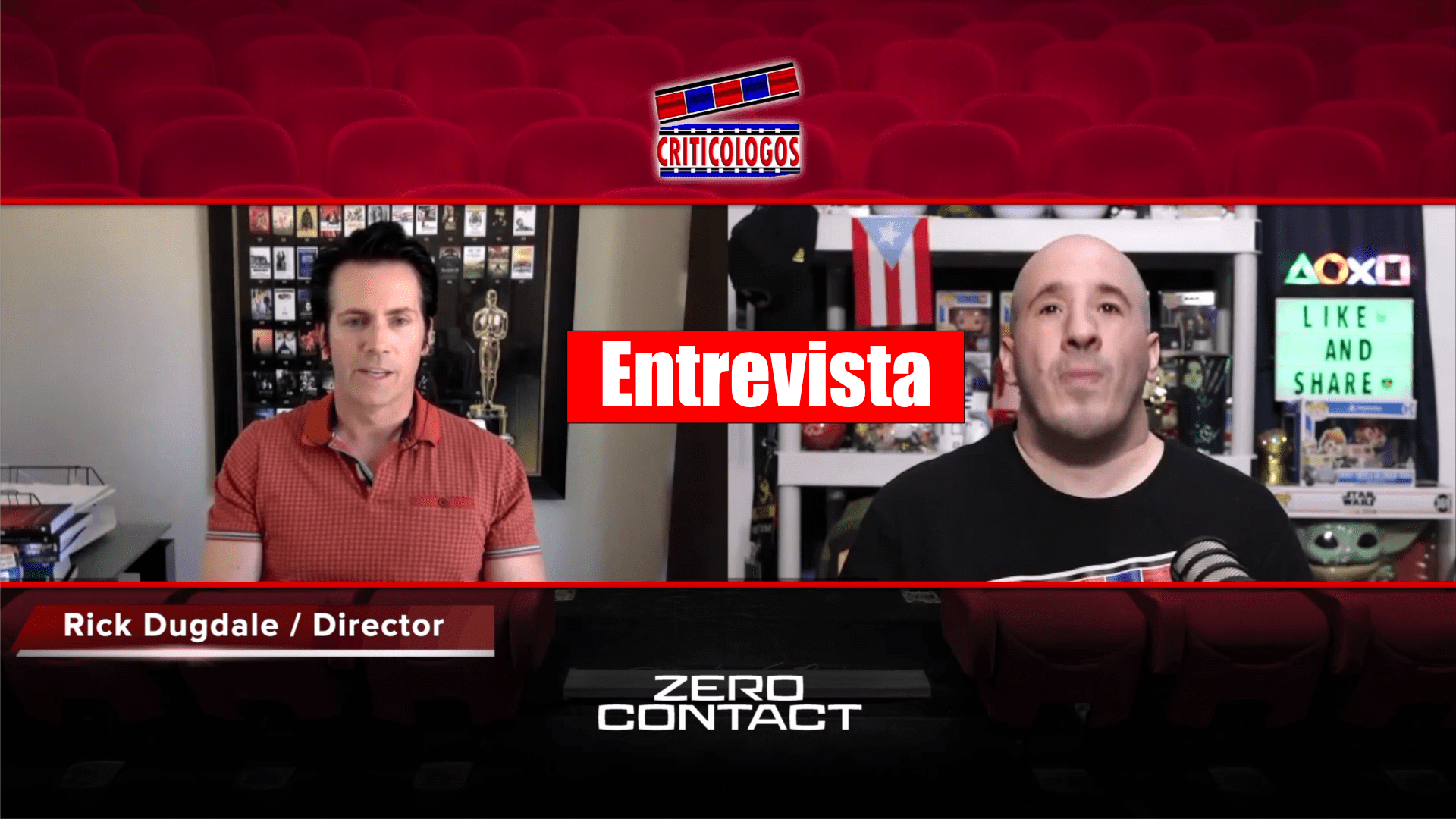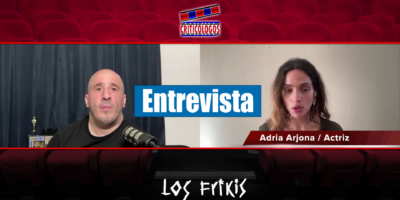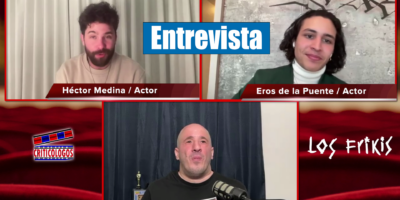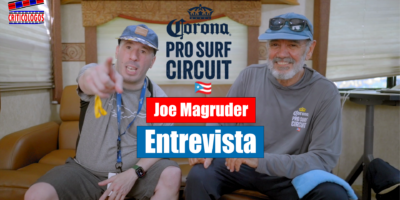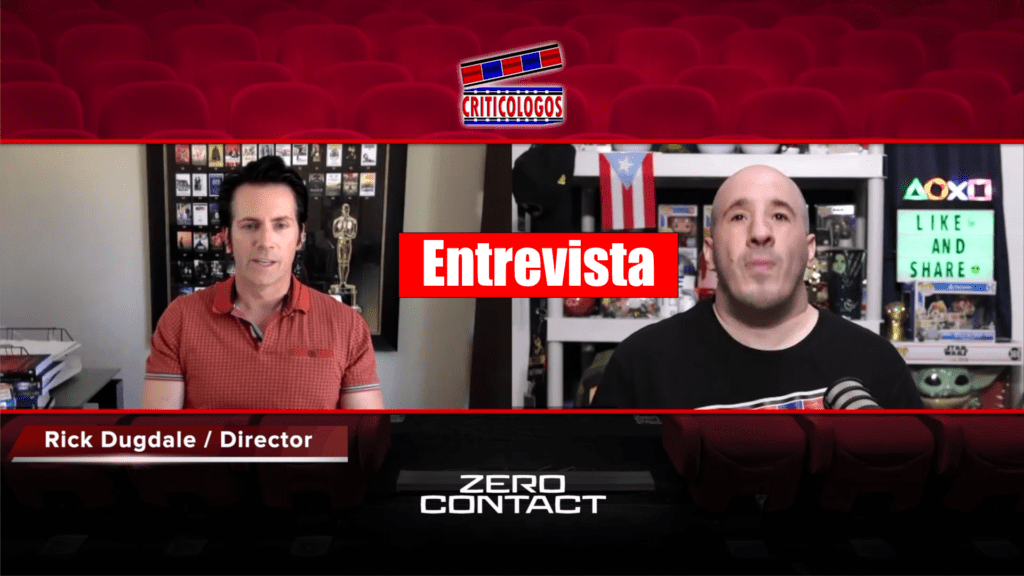
Interview by Rafy Mediavilla, w/ Lionsgate “Zero Contact” movie director, Rick Dugdale, on Zooming into 17 countries to make this thriller work. Out May 27! #ZeroContact
Starring Academy Award® winner Anthony Hopkins (The Silence of the Lambs), this high-tech thriller chillingly reimagines our isolated, virtual world. Hopkins plays Finley Hart, the eccentric genius behind a global data-mining program. Upon his death, five remote agents — including Finley’s son — are contacted by a mysterious A.I. entity to reactivate the initiative, which may enable time travel. As sinister events occur at each of the agents’ homes, they must decide whether entering their passwords will save the world…or destroy it.
Criticólogos:
This is a full-blown thriller full of twist and turns, when you spoke to the screenwriter. But did you have any clue where the story was going?
Rick Dugdale:
Yeah. So when the pandemic hit, we had a think tank with the international think tank and were fortunate enough to shoot a lot of our films around the world. So we brought a lot of our colleagues together and said, okay, well, how do we make a film if we can’t be in the same room together? And we’re very writer, focused company, and so we had connections and the company and him and I started sharing these ideas. And I think the original concept came with what if five world leaders were assassinated at the same time around the world by the same person? And there’s another story for someone else today, but that was the inception of it.
And Canno is so amazing and so fast that he ran it. And like ten days later, we had a script that everyone read and said, Wow, this is a good bee. It’s makeable under the restraints that we are facing. And so we reached out to all of our partners around the world and started convincing them that, Hey, we’re going to need you, and I know you’re available because there’s a pandemic going on. And I started putting it together real quick.
Criticólogos:
What was their reaction to the actors? But what was their initial reaction when they saw the scope of the story and how it’s been all played out?
Rick Dugdale:
You know, I think it’s first of all, it’s great. I knew them in advance. And so they knew that when, you know, Rick has these crazy ideas, maybe we should hear him out. They don’t always work. But, you know, I think a lot of it was the fact that, yes, they were doing nothing. But then you share the script with them, then you share their kind of the grand plan. And the grand plan at the time wasn’t sequels and shooting around the world. It was like, Hey, let’s have some fun, make this film. But I also knew that with the pandemic that, you know, every country was facing the same situation. So the filmmakers that we were working with, that we were are top tier professionals.
So we would have a great crew all around the world that could come together. And as long as everybody brought it, which we knew they could, then hopefully to have an outcome that was something worthwhile. But I know going into it, the first few days of shooting and it was structured like a real film we had already, Carlsen was the A.D. and we would stand on set using Zoom. It’s not a Zoom movie, right? We’d stand on set and would line things up. Okay, guys, quiet. On the set was turn. Turn off your camera stick. Make sure that light in the background you’re like and share a sign in the back.
We had a fix. That’s too bright. Okay, guys, you’re good and roll cameras, and they would, you know, do it themselves. And then and then we would do a take, you know. So once we did the first couple of days, I think that’s when they realized this is something worthwhile.
Criticólogos:
How did the title come about and how can you explain to people how the story, the detail revolves around the title?
Rick Dugdale:
Yes, so originally when we said, okay, well, can we make a film this way with all of our friends and colleagues? Okay. If we’re going to do it, it can’t be a horror movie slasher flick and it can’t be about COVID or the pandemic. It’s got to be about something else because we’ve assumed other people were going to try to do something like this, because, you know, we’re all filmmakers who get bored sitting still. So and I know there were some out there that were Zoom horror movies that nobody wants to relive living on Zoom in a pandemic as much as possible. So right away, we knew we kind of separated ourselves that you could have this tech, scientific thriller that was, you know, the mode of the way we told the story.
Using this remote connection played into the storyline of them all having to come together around the world. It was also important if you’re going to make a movie that has stands, any chance you need to have an international storyline? We feel as though by doing this you could bring people with different dialects, and we had to some of the podcast, we had to find value in every component. Right. So whether it be the sound, the accent of Hakka, Nordquist, that will tell the audience, wow, this is a global thriller. It’s not just shot in Los Angeles or something. Right. So that’s kind of how we can come at it with Recue and Tokyo.
And all of a sudden it tells the audience is is international. And so we kind of had a formula that we were trying to stick to without really knowing what the formula was, because there was a bonus zero contact. Originally was called 92 and which is was tied to what may have happened in 1992. So that would be a spoiler alert, you’ll see. But 92 was also the name of a potential time machine the family was working on. It’s not really a spoiler. And that number kind of stuck because the whole production in post-production, the joke was wherever we went, it was 92 degrees outside.
I’m traveling 92 miles an hour. This graffiti. 92. So we couldn’t escape that number. We kind of thought, hey, this this number, it means something more so. But it was obvious that to, you know, to release the movie Zero Contact being the double entendre, it was just the perfect title and 92. And all those elements will play into the whole universe that we’re building at work.
Criticólogos:
What can you tell us, without entering into spoilers, were people can expect this story to go in the future?
Rick Dugdale:
I think the best part about this film is that it will always be the origin story and you will always need to reference back to it to understand where the world was built from. But I think the thing is, is that when you tell a story about time travel, first of all, the world, there’s so many possibilities where you can go when you’re using time travel. But I think what you’re what you’re going to see is the seriousness and sophistication of where the storyline is going to go. And that is if it’s about fame and fortune as a power figure to build a time machine.
What if it wasn’t always about that? It was about something more of a life world, world connection to family or something like that. So a sophisticated, intelligent thriller, I think is where this is going to go, that it’s going to require people to kind of see the origin story. Obviously, the sequels are not going to be told using this device unless there’s another pandemic, which I hope not. But those will be shot conventionally all around the world.
Criticólogos:
What would you tell people that may to be 100% convince, you must watch this movie?
Rick Dugdale:
You know, what’s interesting is, personally, I’m not a sci fi fan. Really? This film would be considered sci fi. I believe. But imagine if this wasn’t sci fi and it was science. Right. And you use quantum theory and quantum physics for the people that actually have an understanding of that without, you know, it doesn’t have to be you don’t have to have a full understanding of quantum physics to realize that. What if you use science to find the past versus what if it was real? What if? What if inception? What was real? Right.
And if there are those ways to get there using science, not science fiction, how terrifying would that be? And yet thrilling at the same time. Right. And I think that is a takeaway from this film that you’re going to learn, is that that you’re going to be left going, oh, wait a second, I can go back.
See the interview below:

